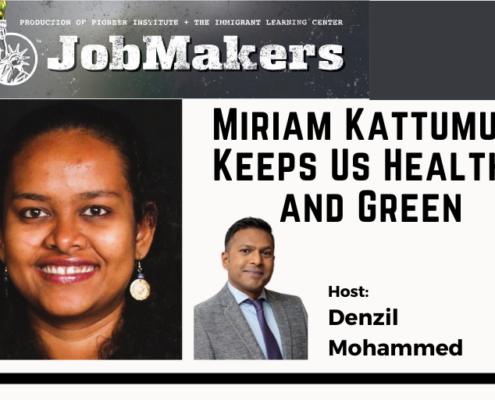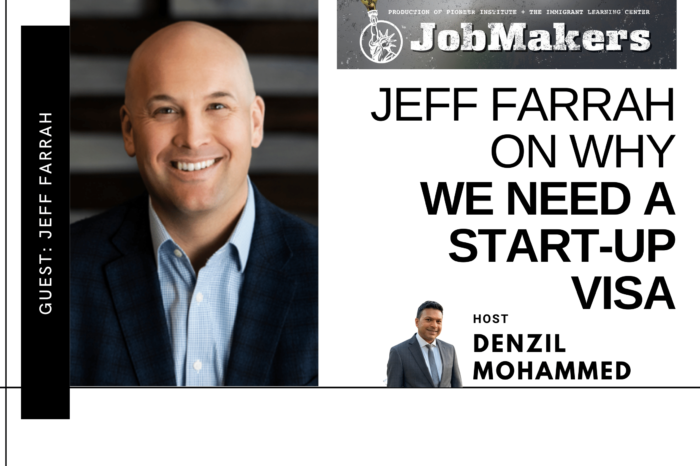Jeff Farrah on Why We Need a Start-Up Visa
/in Economic Opportunity, Featured, JobMakers, News /by Editorial Staff
This week on JobMakers, host Denzil Mohammed talks with Jeff Farrah, General Counsel at the National Venture Capital Association, a D.C.-based group that advocates for public policy supportive of American entrepreneurship. They discuss why we should adopt reforms such as a “start-up visa,” allowing immigrant entrepreneurs to stay here in America so we can benefit from the potential job creation, innovation, and economic dynamism of newcomers who graduated from our universities, worked for American companies, or simply have a viable plan to start a business. Jeff knows that immigration and entrepreneurship go hand-in-hand, that immigrants are twice as likely to start a business, and that it’s not just big policy changes that could move the needle, as you’ll learn in this week’s JobMakers.
Guest:
 Jeff Farrah serves as General Counsel at NVCA, where he advocates before Congress, the White House, and agencies for pro-entrepreneurship policies and leads in-house legal matters for the association, including management of the NVCA Model Legal Documents. He loves working at the intersection of venture, public policy, and the law. Jeff concurrently serves as Treasurer of VenturePAC, the political action committee of NVCA. Prior to joining NVCA, Jeff was Counsel to the U.S. Senate Committee on Commerce, Science, and Transportation where he advised Chairman John Thune (now Senate Majority Whip) and members of the committee on technology, telecommunications, and Internet policy. His committee perch gave him an invaluable perspective on how policymakers think about technology and its impact on American life. Previously, Jeff served as General Counsel to U.S. Senator Scott Brown, serving as Brown’s top legal and policy advisor on a variety of issues. During the 2012 presidential election, Jeff was a member of Governor Romney’s Trade Policy Advisory Committee. Prior to the Senate, Jeff was an attorney at a leading Washington, DC law firm for international trade matters. His trade law experience includes World Trade Organization Dispute Settlement and trade remedies cases before U.S. agencies. A native of southern California, Jeff earned his Bachelor of Arts degree in Political Science from the University of California, Santa Barbara (Go Gauchos!) and his Juris Doctor from Seattle University School of Law. Jeff was a Visiting Student at Georgetown University Law Center.
Jeff Farrah serves as General Counsel at NVCA, where he advocates before Congress, the White House, and agencies for pro-entrepreneurship policies and leads in-house legal matters for the association, including management of the NVCA Model Legal Documents. He loves working at the intersection of venture, public policy, and the law. Jeff concurrently serves as Treasurer of VenturePAC, the political action committee of NVCA. Prior to joining NVCA, Jeff was Counsel to the U.S. Senate Committee on Commerce, Science, and Transportation where he advised Chairman John Thune (now Senate Majority Whip) and members of the committee on technology, telecommunications, and Internet policy. His committee perch gave him an invaluable perspective on how policymakers think about technology and its impact on American life. Previously, Jeff served as General Counsel to U.S. Senator Scott Brown, serving as Brown’s top legal and policy advisor on a variety of issues. During the 2012 presidential election, Jeff was a member of Governor Romney’s Trade Policy Advisory Committee. Prior to the Senate, Jeff was an attorney at a leading Washington, DC law firm for international trade matters. His trade law experience includes World Trade Organization Dispute Settlement and trade remedies cases before U.S. agencies. A native of southern California, Jeff earned his Bachelor of Arts degree in Political Science from the University of California, Santa Barbara (Go Gauchos!) and his Juris Doctor from Seattle University School of Law. Jeff was a Visiting Student at Georgetown University Law Center.
Get new episodes of JobMakers in your inbox!
Read a Transcript of This Episode
Please excuse typos.
Denzil Mohammed:
I’m Denzil Mohammed. And this is Jobmakers
Denzil Mohammed:
As we’ve established in this podcast, immigration and entrepreneurship go hand in hand, immigrants are twice as likely to start a business. So why then don’t we have a visa allowing immigrant entrepreneurs to stay here? For Jeff Farrah, general counsel at the National Venture Capital Association, a DC-based group that advocates for public policy that supports American entrepreneurship, a so-called start-up visa is a no-brainer for immigrants who went through our universities or worked for American companies, or simply have a viable business plan and want to start a business here. We should be rolling out the red carpet. Instead we reject them and actively deny ourselves job creation, innovation and economic dynamism. Jeff is advocating for a startup visa and other immigration reforms that would bring jobs to America. And he notes that it’s not just big policy changes that could move the needle. As you’ll learn in this week’s Jobmakers. Jeff Farrah, thank you for joining us on Jobmakers. How are you?
Jeff Farrah:
I’m doing well. Denzil. Thanks so much for having me. So
Denzil Mohammed:
Why is immigration such an important issue to the National Venture Capital Association? I see it’s one of your 10 issue areas. Where does it rank and why?
Jeff Farrah:
Well, you know, I kind of think back to a conversation I had with a board member of ours several years ago. And we were walking in, in DC, between meetings at an agency and on the way to Capitol Hill. And we were talking about a lot of the issues on NVCA’s list. And, you know, we said so many, the things you all do were so to us and important to the founders. But when you think about immigration, you’re really talking about the whole company because without these individuals coming to the United States, oftentimes to launch a high-growth startup, that there’s no company in the first place. And so it’s kind of a Genesis moment in some ways. And so I think that, you know, all you have to do is look at the storied history of immigrant entrepreneurs who have launched so many iconic US companies. And it becomes obvious why it is that we really need to make some serious changes in this country, if we’re going to remain the best place in the world to launch a high-growth company.
Denzil Mohammed:
So has it always been a focus of your association or have there been times where it’s taken precedent over others?
Jeff Farrah:
Well, certainly a lot of times with any trade association, we’re a little bit at the whims of what it is that Congress and federal policy makers are doing. And so certainly there are times when immigration is something that is a lot more on the list. And, you know, I’m reminded of course, of the time period during the Obama administration, where there were efforts to pass comprehensive immigration reform reform also happened during the Bush administration, of course, during the 2013 bill that I’m referring to, there was a start up visa that was included in that that NVCA had a lot to do with pushing. It’s certainly been a piece of NVCA’s advocacy work for many decades. And, and this is something where going back about 15 or 20 years, it was a group of venture capitalists that, that really recognized first that we didn’t have a tailor made way to be able to have foreign born entrepreneurs come into the country, that we were very much using these square peg round hole solutions, and that we needed to have a, a more elegant way to allow these individuals who want nothing more than to launch new American enterprises to be able to come to our country.
Jeff Farrah:
And so really ever since then, a startup visa has been something that has been at the forefront. And we’re of course, very interested in, in getting this across the finish line, but I’ve had a number of successes along the way.
Denzil Mohammed:
So this startup visa, you make it sound as though it’s almost inherently American this idea of enterprise and starting a business and creating opportunity. So I see several countries have some for some form of a startup visa. I mean, from Australia and Canada, all the way to Estonia and Lithuania the Netherlands, Singapore, Denmark where is the US on this issue?
Jeff Farrah:
Unfortunately we’re not by far enough along. And I, I think, you know the countries that you’ve mentioned, you know, both in immigration, but in other policy areas too, they they’ve seen all the benefits that, that high growth startups have created in the United States. And our playbook is, is obvious in terms of the things that we have done in this country to create that secret sauce. And so other countries are trying to replicate a lot of the policies that, that we have had historically in this country, but in, in one way, they’ve, they’ve innovated and, and kind of done things that we’ve not been able to do, which is in trying to attract the world’s best entrepreneur entrepreneurs to their shores. And so, despite the fact that we’ve seen this proliferation of other countries creating startup visas, we, we have not in the United States and it’s not cuz it’s a terribly controversial idea.
Jeff Farrah:
In fact, you know, in my time talking with a lot of lawmakers, you don’t really get any pushback on the substantive issue. If you ask people, should we make it easier for individuals who want to create new American companies and give American citizens jobs? Should we allow those people to do some easily? You will probably get 535 members of the house and the Senate to nod an approval. The tricky part though, is that immigration policy tends to be caught up in some other very, very controversial issues. And we’ve been in a, a bit of a dynamic here in the last several years where not much else can move on immigration reform unless the entire package moves. And so the politics tend to be very complicated and it does lead to this unfortunate situation where perhaps some of the low hanging fruit like a startup visa are, are not able to get across line.
Jeff Farrah:
And we’ve certainly tried to come up with, with perhaps creative ways of addressing that, but ultimately have not been able to, to get the, the bill passed. We have been very, very fortunate to have champions on this issue on a bipartisan basis, going back many years, the most recent version of this that viewers should should tell a look at is called the like act from Congresswoman Zoe Larine its the let immigrants kickstart employment act. And this is Ms. LG Green’s latest version of, of a bill. She had done previously to create a start at visa and she both creates a non-immigrant visa and then an immigrant visa that individuals can into. So if you first come on the non-immigrant visa or you come on an oh one, a visa, you can graduate into the immigrant visa on a pathway to citizenship. And then over in the Senate side, there is a, a larger bill called the startup act, which does a number of, of things in startup policy. And that’s from a group of Senator Mark Warner from Virginia, Jerry Moran from Kansas, Amy Klobuchar, Roy Blunt, really a great group of senators. And within that bill, there is also a startup visa. So that really shows that there is the capability of this really getting the attention of people from all different political stripes.
Denzil Mohammed:
I understand this idea of, of it being mired within something that’s so politicized and so contentious immigration. Whereas it’s, it’s such an integral part of who, of what America is. And I, I know of many stories of entrepreneurs or voting entrepreneurs who because of our immigration and were not allowed to stay here and start their companies an educational online resource called Sutori started by a group of three immigrants. It ended up being, you know, two of them had to go to other countries in order to, to continue the business. Only one was, was allowed to stay here. And you, you spoke earlier about, you know, it being such a part of our, of America, America’s secret sauce. So many iconic American brands, Levi’s jeans, Kraft, Coors bear, Budweiser up until Tesla and Google and eBay all founded by immigrants. Explain to me how the startup visa would work and you know, other initiatives that, that you’ll support like us, you know, the idea of stapling, a green card onto college diploma. Mm-Hmm
Jeff Farrah:
Sure, you know, I, I think that a great illustration of how the startup visa works is, is mentioning perhaps a, another famous foreign born entrepreneur. There’s a gentleman named Jyoti Bansal and Jyoti is from India, originally. He came to the United States on an H 1 B visa and he wanted to be an entrepreneur, but he was working under his H1B status. That was the, the authorization that he had to be in the country. And Jyoti has talked publicly about the fact he needed to wait seven years in order to get his green card. Well, of course he couldn’t launch his own company while he was working on an H1B visa. So he needed to have the green card to be able to go and, do that. And so you kind of think about somebody like him, who is unnecessarily waiting to do what they’re probably put on this earth to do, which is to launch a, a high growth company.
Jeff Farrah:
Well, Jyoti finally gets the green card. He launches a company called app dynamics and AppDynamics on the eve of its IPO ended up selling to Cisco for $3.7 billion. And you think about that situation. Well, obviously Jyoti has done a tremendous job of creating value. He’s got lots and lots of employees, a leading American technology company values it at almost $4 billion. And you think to yourself, well, it’s really a shame that we had to wait that additional seven years for that individual to go off on their entrepreneurial journey. And then the other issue that Jyoti has talked about is that he had friends of his during the same time period, that didn’t feel like they could wait all the time that was needed. And so they ended up leaving the country and going and launching new companies in other countries.
Jeff Farrah:
And that is unbelievably frustrating because the United States could have had those companies. We could have had that additional dynamism in the economy. We could have had that employment. We could have had that innovation, the intellectual property, so on and so forth. And I think that, you know, one thing that we’ve spent a lot of time talking with policymakers about is there’s this, there’s this recognition. I think in, in a lot of circles here that the venture has really become globalized in, in many ways, because as I said before, so many countries have copied our playbook and this is a perfectly reasonable thing for them to do, to try and create startup ecosystems in, in their own countries. If you look out over the last 20 years or so ago, the United States used to get about 86% of the global venture capital pie that would go into us startups that number’s been dropping over the course of the last couple decades.
Jeff Farrah:
And the last couple of years, we got about 51% of global of venture capital. Now the total number of course continues to go up. We continue to raise more venture capital here in the United States, which is a good thing, but it also shows that other countries are getting their act together. And they are able to welcome these individuals who are unfortunately not welcomed in the United States with, with something like a startup visa. And so that’s something we’re really trying to fix here because I think that ultimately the visa categories that we have now at our disposal, they’re not made for the entrepreneurial model. You think about an individual who goes to work at a large tech company on an H one B visa. That’s a, a different circumstance as somebody who wants to launch his or her own company, or you think of somebody on an oh one visa.
Jeff Farrah:
Sure. There are lots of entrepreneurs that end up getting, oh one visas. And, and that’s a, a great thing. And, and certainly a, a bit of a, a way to kind of capture some individuals. But when you’re trying to measure whether or not someone is extraordinary enough to get that, oh, one visa, that means they have to have a certain track record of accomplishment to point it to, to, to the direction of U S C I S, which ultimately is making those decisions that doesn’t work very well. If you’re 23, 24, 25 years old, and this is your first company, or maybe it’s your second company and your first one failed. And so are losing entrepreneurs who are not able to use the categories that we have now, which is why we need to create a category for these individuals who wanna launch these companies so that we don’t lose out on those opportunities going forward.
Denzil Mohammed:
And in their own way, certain states have actually stepped in to try to solve this in Massachusetts. For instance, there’s something of the global entrepreneur residence program, a way to bypass the quarters that would allow high skilled immigrants. Who’ve gone through our university system to be able to stay here and incubate their businesses. Thomas kero, the person I, I mentioned that was his only avenue in order to be able to stay here. How would these startup visas create this ripple effect of employment in the economy?
Jeff Farrah:
Well, I think that, you know, the, the, the economic literature on this is, is very, very clear, which is that the, the, the growth in our economy, the, the dynamism that I referenced before, it comes from young companies as they, they scale and grow. And, and you look at these companies that are five years old or less, and the are the key drivers of employment, where you have a lot of larger companies that are roughly hiring and firing in proportion on an annual basis. And that’s probably going to be the way it’s always going to be. But then a lot of the growth comes from these, these really special high growth young companies. And so we need to figure out a way how it is we get more entrepreneurship, how it is. We convince people that they need to leave their perfectly secure jobs at, at pick a company and jump out and, and do something extraordinary and audacious.
Jeff Farrah:
And so one component of doing that is to allow individuals from other countries who are very interested in following that model to come here, to ultimately do it. And, and so, you know, we, we, we know that foreign board entrepreneurs are, are among the most successful ones. Anecdotally, we also know that immigrants tend to be more entrepreneurial from a lot of the data that’s been published by, I think in the Harvard business review by professor Kerr. And so it’s certainly something that, that seems obvious to us. I, I think that one frustration that we have encountered with a lot of policy makers is this very wrong assumption. That just because the United States has been the, the best place to launch a high growth company in the last 50 years, but that’s necessarily going to be the case in the following 50 years. And that is absolutely not the case.
Jeff Farrah:
We, we cannot afford to rest on our laurels because as I said before, other countries are very, very serious about, about taking this mantle away from us. And we know that entrepreneurs are very influenced by public policy when there are signals that are sent to the market, that is something that, that people ultimately do derive lessons from. And in the case of immigration, if we’re sending up a giant stop sign at our borders to individuals who want to create new companies, those people are dogged individuals, and they will go and start that company in other countries. And there’s new capital available all over the world to do that.
Denzil Mohammed:
It’s so interesting that you talk about this globalization of, of venture capital and, and, and funding and our loss in the, in the rankings in the world. I mean, that’s from 80 something percent to 51%, that’s really astonishing and almost kinda shameful. Describe for me the, the international entrepreneur rule. What is that about?
Jeff Farrah:
Sure. So this is something that NVCA has led on for, for many years. And as I alluded to before, what, when there was comprehensive immigration reform, that was, that was going on in Congress. At one point, it became obvious that that wasn’t going to come to pass. And so what the Obama administration did was it, it asked itself what other tools are out there, where we might be able to, of the path for foreign born entrepreneurs to allow these individuals to create new American companies, but to do that without creating a new visa category. And so what the Obama administration determined is that they could use something called parole authority and parole is used in, in a lot of different contexts to allow individuals from other countries to remain in the United States. And so if you look at the, the statute that that gives the department of Homeland security and, and U S C I S this authority, it talks about the individual needs to provide a so-called significant public benefit to the United States.
Jeff Farrah:
And what the Obama administration did to their credit was they put that in economic context. And they said, when an individual is starting a new company, they are certainly providing a significant public benefit to the United States by way of employment and innovation and, and all the things that that we’ve mentioned before. And so they launched the international entrepreneur role in the final days to allow the department of Homeland security on a case by case basis to look at applications of would be immigrant entrepreneurs and determine whether or not they met a, a series of requirements. And so when president Trump was elected, we, we had a sense that this was going to be tough sledding, just given a lot of the immigration rhetoric that had, had gone on. And so we ended up approaching the Trump administration very early high and really make sure they understood that this was a way to create American jobs here in the country.
Jeff Farrah:
And, and very much should have aligned with, with president Trump’s vision for what he was talking about during that campaign. But unfortunately for us, they didn’t see it that way at all. They made a couple of attempts to repeal it. We ended up filing the first federal lawsuit in the history of BCA against the federal government to block them from, from doing that. We won in federal court, in, in Washington DC. And it was really because of that lawsuit that the international entrepreneur rule was around. Now, we’re in a situation where applicants are starting to apply for, for the international entrepreneur rule. And the final thing I’ll just mention on this is that it was, it was really fantastic that one of the first individuals who ended up getting the, the international entrepreneur real designation was backed by the then board chair of, of, of BCA. So it was a great kind of culmination that you had this individual who was working in the network security field, had a great idea, but was in a bad spot from an immigration perspective. He ended up applying for IER and, and getting it. And so that was very rewarding in to kind of see that happen because of our work, but
Denzil Mohammed:
Looking more broadly at the immigration policies of the last administration. It wasn’t simply a crackdown on unauthorized immigration. They significantly cut legal immigration to the us even the high scaled best and brightest that they claimed they wanted reflect a little bit it on, on what happened over those four years. And, and how, how do you see that as having benefited or hurt the United States?
Jeff Farrah:
Sure. I mean, I think you’ve hit the nail on the head in terms of the, the way it went about. And I think this is something where a lot of the messaging in public from former president Trump, a lot of the individuals in his administrative would talk about illegal immigration as being their focus. And that if individuals just would only go through the, the legal process, then that would be perfectly fine. It’s individuals that didn’t go through the legal process that they had a problem with. But of course that wasn’t what was going on in, in reality, because there was really a two-prong attack that was going on. It was, as they said, ed focused on individuals that perhaps were not going through the process, but simultaneously focused on a lot of individuals that had been waiting in line as folks would would say.
Jeff Farrah:
I think that during the Trump administration, you know, one of the things that, that we were involved with that was, you know, we don’t know, or we cannot quantify rather what types of individuals had a, a painful experience and gave up their, their desire to come to the United States, to either work at a high tech company or to go through a process, to try and become an entrepreneur. And so that’s something where those individuals probably are in other geographies now working on their companies and, and that’s real lost economic value that our country is not going to get back.
Denzil Mohammed:
So I took a look at the white house’s website to see what the Biden Harris administration’s top priorities are, and immigration is one of them. They call it outdated, they call it long broken system. What is the path forward?
Jeff Farrah:
Well, I think, you know, right now we’re in a situation where clearly the president is, is focused both on COVID, but also on the build back better agenda. And that’s dominating the headlines. And, and certainly something that I think Democrats are clearly highly motivated to get this over the finish line during, during this calendar year. And so I think that’s going to be the focus. It, it does not look at this time as if immigration policy is going to be able to be in the build back better act. And, and that really is because of the budget reconciliation tool that the Democrats are using here. And there are a variety of rules that apply to the types of things that can go into that bill. And so, in terms of, of looking forward, you know, this has been an issue that there are a lot of key constituencies, especially within the democratic party that have wanted to make progress in immigration reform for many, many, many years. And it’s been incredibly frustrating. And so I suspect that there will be a concerted effort to make progress on this. I think though that the, the issue will come ultimately what the makeup is of the house and the Senate. And that might be something that, that might frustrate a lot of these efforts going forward. And so I think that, you know, some people are projecting that Republicans are, are likely to take the house. Perhaps they will take the Senate that probably doesn’t, doesn’t lead to a, a positive outcome on immigration reform
Denzil Mohammed:
Is not even necessarily an immigration issue. I mean, it’s, it’s business generation, it’s it’s job creation and it’s inherently American. I think that’s, that’s where it fits into the narrative for me, as far as I see it, but it’s also human issue. It’s, it’s, it’s people who, you know, build up dreams and, and, and need a place where they can act to their ideas for the benefit of the host country. Right.
Jeff Farrah:
I completely agree. And you know, the thing too, is that there, there are these efforts right now going on on a so-called China bill, and it’s gone by a bunch of different names over time.
Denzil Mohammed:
I wish you the best of luck in your advocacy and in your work. And I hope more people do on your coalition to be able to get these things done. We need an immigration system that works for all of us, right?
Jeff Farrah:
We do. I appreciate you shining a light on this, and it’s been a pleasure to be part of the conversation.
Denzil Mohammed:
Jobmakers is a weekly podcast about immigrant entrepreneurship and contribution produced by Pioneer Institute, a think tank Boston and the immigrant learning center in Malden, Massachusetts, a not for profit that gives immigrants a voice. Thanks for joining us for today’s insightful conversation and how welcoming entrepreneurial talent benefits all of us. It’s a good way to end our first year. Jobmakers will take a break for the holidays and return on January 6th with a fascinating interview with the author of “Open: the Story of Human Progress,” on how borders are actually holding us back. Send your questions to Denzil that’s D E N Z I L at Job makerspodcast.org. I’m Denzil Mohammed. See you in 2022 for the next episode of Jobmakers.
Recent Episodes:
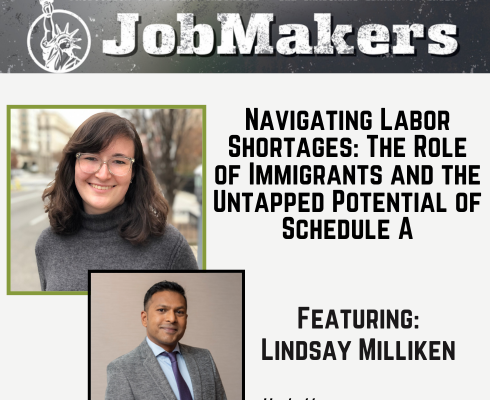
Navigating Labor Shortages: The Role of Immigrants and the Potential of Schedule A
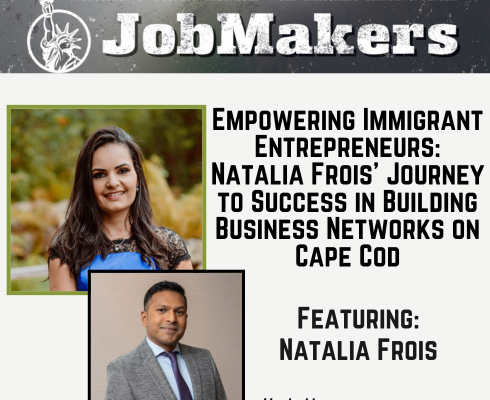
Empowering Immigrant Entrepreneurs: Natalia Frois’ Journey to Success in Building Business Networks on Cape Cod
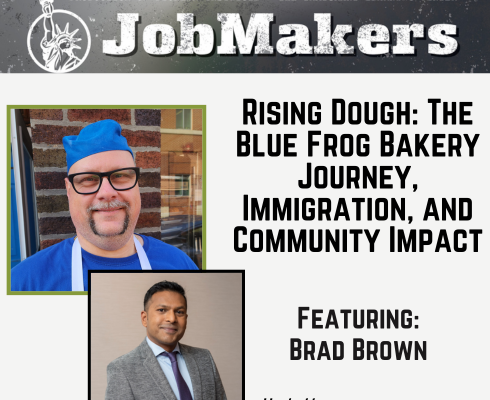
Rising Dough: The Blue Frog Bakery Journey, Immigration, and Community Impact
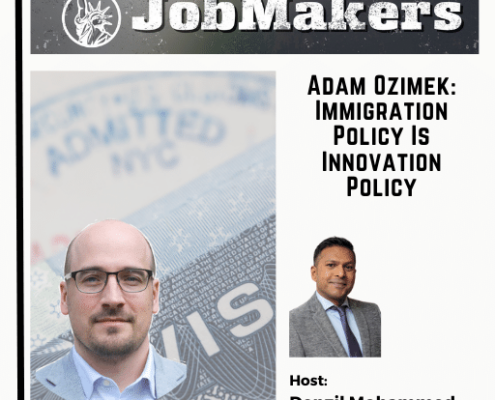
Adam Ozimek: Immigration Policy Is Innovation Policy

Sebastian Corbat Brings Us Healthy Foods ‘From the South’
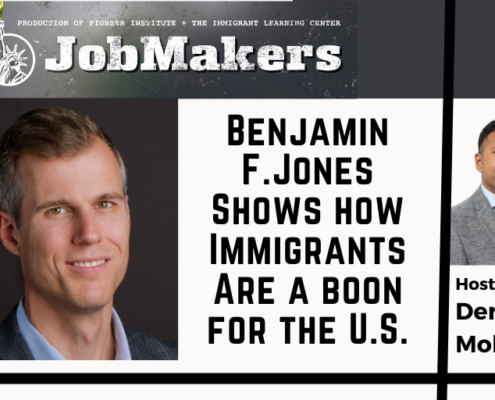
Benjamin F. Jones Shows How Immigrants Are a Boon for the U.S.
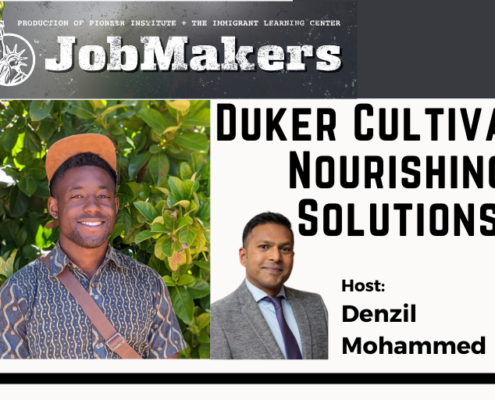
Duker Cultivates Nourishing Solutions
